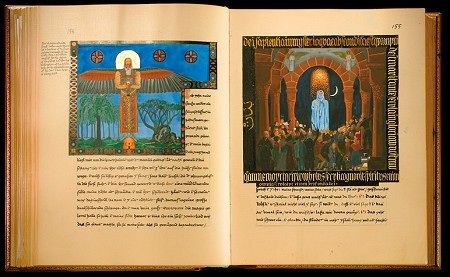Let’s Keep Jung’s Red Book Away from Spiritual Hucksterism

It is now quite clear that Jung’s Red Book, which I wrote about in an earlier post, has created quite a stir in certain circles, and has been very well popularized. It has had quite an impact in cultural and literary circles, and has gained a lot of attention in the media since its publication.
On the whole, those who appreciate Jung’s psychological work must necessarily feel good about this. Those of us who are passionately convinced that Jung has something profound to say about the human psyche and about life in our time cannot help but feel joy that his message is getting out more widely and deeply in our society.
However, it is hard at times to avoid the feeling that Jung’s legacy is suffering from an approach that is overly-commercialized. I don’t fault W.W. Norton for a moment for bringing the Red Book to publication, even though Jung himself was very clear that he did not want it published, at least not in his lifetime.
The Red Book documents Jung’s own profound psychological struggle in a manner so eloquent and deep that it is difficult if not impossible to describe. The world owes the Jung family, the Philemon Foundation, editor Sonu Shamdasani and W.W. Norton a huge debt for bringing the Red Book to the world. In the sincerest possible way, I thank them all.
But do we really need mystifying and sensationalistic messages associated with it, such as the following?
Jung’s Red Book is a magnificent record of his interior journey through the most profound crisis of his entire life. It is as if at every turn of the page Jung meets us, personally, with the same wrenching, implacable questions that he meets himself as he descends into his own depths. Who are you? What are you? What are the unknown elements of yourself?
Do we really need this profound encounter opened up for us on the lecture circuit? Or in webinars? Or in talk show formats with Jungian analysts and pop culture celebrities?
Can we honestly persuade ourselves that Jung would have wanted this? Frankly, who are we trying to kid?
As Jungian analyst Wolfgang Giegrich is at pains to remind us, Jung’s Red Book is not “The New Bible”. Those of us who love Jung need to be careful not to portray it as some kind of divine revelation composed by a semi-divinity which answers all questions. It’s the record of a very human struggle by someone who was ready to encounter his depths and ready to try to acknowledge his weakness and the inferior and broken parts of himself. If we read the Red Book carefully, we’ll encounter Jung’s shadow. We may not always like that and may be uncomfortable or even shocked by it. Nonetheless, it’s a reminder that here was a human being much like you or me, who really wrestled with his darkness, and fought his way into it and through it to his own unique selfhood, and his own healing. And he invites us to do the same.
Have you had any experience with Jung’s Red Book, reading it or seeing one of the current exhibits? I’d love to hear about it if you have.
I wish you all the very best on your personal journey to wholeness,
Brian Collinson, Psychotherapist & Jungian Analyst
[cta]
VIDEO CREDITS: © W.W. Norton & Company; © Digital Fusion Creative Technologies Inc. These images are the property of W.W. Norton & Company and/or Digital Fusion Creative Technologies Inc. and are used here in the fair use context of critical discussion.
© 2010 Brian Collinson

Gwynne Mayer
I use the Red Book daily and journal to Jung in doing my own inner work. I find, through the last 30 years, I have grown considerably keeping my journals ‘as if’ I am talking to and with Jung through his letters and now through the Red Book. Thanks so much for your Blog.
Nancy
I had the experience of seeing the Red Book exhibit at the Library of Congress and attend the Jung Symposium that was held in conjunction with its opening in June. The symposium and exhibit, I felt, conveyed Jung’s own exploration of answering the questions as you put so well, “Who are you? What are you? What are the unknown elements of yourself?” It was also a good introduction to people who might not be familiar with Jung and Analytical Psychology.
I agree with you in regards to the Red Book that we, “be careful not to portray it as some kind of divine revelation composed by a semi-divinity which answers all questions.” I feel that Sanu Shamdasani said it so well in the NYTimes article on the Red Book when asked what Jung’s message might be with the Red Book. Simply put he replied, “Value your inner life.” I believe your post is a reminder of this – thanks for sharing your thoughts on it.
Brian C
Nancy- Thank you for commenting. “Value your inner life.” Yes, surely that’s the heart of it. I think that the focus, as we move forward in unfolding the meaning of the Red Book has to be exactly that. In Jung, we have a profound example of someone who undertook the inner journey. This puts a a deep, very personal question to each of us. What does that inner journey look like for each of us, individually? I cannot take CG Jung’s inner journey, and he cannot take mine, much as I may respect and even honour what he did. Like him, each of us has to find our courage, and go within to ourselves.
Para los amantes de la psicología jungeana » Revista Cultural de la Conciencia
[…] de la información: Journeying towards Wholeness; un blog de Brian Collinson Posted by Rosario at 6:14 […]